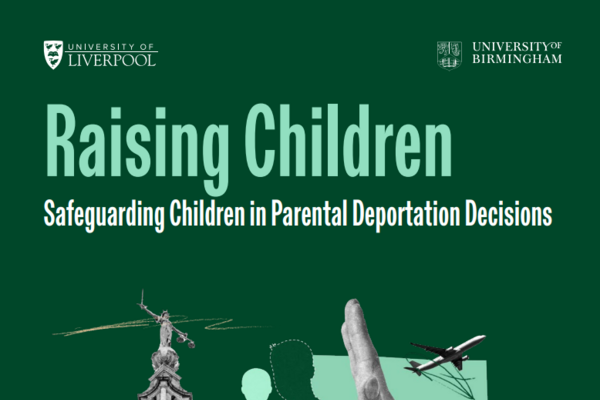NEW REPORT FINDS HOME OFFICE IS SYSTEMATICALLY FAILING IN ITS DUTIES TOWARDS VICTIMS OF TRAFFICKING – NEW ‘TASKFORCE ON VICTIMS OF TRAFFICKING IN IMMIGRATION DETENTION’ LAUNCHED
Today, the Labour Exploitation Advisory Group [i] has published a concerning new report on victims of human trafficking and immigration detention.
The report,‘Detaining Victims: Human Trafficking and the UK Immigration Detention System’, [ii] has identified 143 victims of trafficking who have experienced immigration detention before or after being referred to the National Referral Mechanism (NRM) [iii] and features individual real cases.
The report finds that:
- The Home Office is acting in direct conflict with its own rules and guidance regarding use of immigration detention and treatment of victims of trafficking [iv]
- The Home Office is potentially in breach of international obligations regarding victims of trafficking [v]
- Detention powers are being used to ‘safeguard’ victims of trafficking and to coerce them into entering the National Referral Mechanism [vi]
- There are consistent and systemic failures, largely due to conflict of interest of having HO in charge of tackling modern slavery at the same time as overseeing immigration [vii]
In summary, the report finds that Home Office policies and practices are not fit for purpose and are consistently failing to identify and support victims of trafficking.
NEW TASKFORCE LAUNCHED BY MAJOR CIVIL SOCIETY ORGANISATIONS
In response to the findings of this report, and other recent reports on this topic, today also sees the launch the new ‘Taskforce on Victims of Trafficking in Immigration Detention’.Taskforce on Victims of Trafficking in Immigration Detention’. The Taskforce will seek a permanent end to the immigration detention of victims of trafficking and, if any are identified within detention, it will push for a policy of immediate release. [viii]
The members of the Taskforce are:
- Focus on Labour Exploitation (FLEX)
- Anti-Slavery International
- Bail for Immigration Detainees
- Ashiana Sheffield
- Association of Visitors to Immigration Detainees (AVID)
- Medical Justice
- Duncan Lewis Public Law
- Jesuit Refugee Service UK
- Helen Bamber Foundation
- Latin American Women’s Rights Service
- Women for Refugee Women
The Taskforce launches with a joint statement [ix], calling on government to ensure it treats victims of trafficking as victims, rather than immigration offenders, excerpted below:
“Members believe that immigration detention should play no part in a progressive and fair immigration system. Until this is realised, the Home Office must immediately strengthen and implement its own guidance to ensure that no victim of human trafficking is ever detained…Locking up people who have experienced exploitation is completely at odds with any meaningful national plan to address modern slavery.”
The full joint statement can be found online here: https://labourexploitation.org/about-us/taskforce-victims-trafficking-immigration-detention
Regarding today’s new report and Taskforce announcement, Pierre Makhlouf, Assistant Director at Bail for Immigration Detainees, said:
“There are failings affecting the victims of human trafficking from the outset of detention and at every point in the decision-making process. These failings are leading to the systematic and continued detention of some of the most vulnerable people who find themselves detained for immigration reasons.
The Detention Gatekeeper system that is intended to prevent the detention of people who have been trafficked is failing. It needs to have the detection of potential victims of trafficking factored into its decision-making process. The failure of the system at present is also demonstrated by the fact that in 2018, the Home Office maintained detention in 77.6% of cases where someone was identified as vulnerable by its own policies.
We have repeatedly seen vulnerable people refused bail despite the Home Office’s guidance intended to protect ‘adults at risk’ in detention. The government must review its approach to these cases so that the needs and rights of those who are victims of human trafficking are protected.”
Leticia Ishibashi, author of the report for Focus on Labour Exploitation (FLEX), said
“The detention of hundreds of victims of trafficking is a reflection of the Home Office’s conflicting responsibilities: tackling modern slavery while enforcing a hostile immigration policy. People who have experienced severe exploitation are being treated primarily as immigration offenders rather than victims, with many of them being overlooked, poorly supported and at the very worst, removed from the UK at the risk of being re-trafficked. If the UK wants to lead the fight against modern slavery, it should ensure that no victim of trafficking is detained under immigration powers.”
Rachel Mullan-Ferroze, Service Manager at Ashiana Sheffield, said
“It's clear from our experience that the government is prioritising its immigration policy over the rights and wellbeing of victims of trafficking. In one case, we sought the release of our client, “Peter”, when he received notification from the Home Office that he had been recognised as a potential victim of trafficking. His release was refused on the grounds that government believes victims' entitlements can be met within detention. Detaining someone whose liberty has already been curtailed by his experience of trafficking amounts to further victimisation, and cannot remotely match up to international obligations regarding victim support."
Gisela Valle, Interim Director of the Latin American Women’s Rights Service, said
"All too often, we see women being failed by the system and detained under immigration powers despite being survivors of trafficking. The immigration enforcement teams and police lack a proper understanding of trafficking and its indicators, particularly in cases which are less immediately obvious, such as in domestic servitude and other highly feminised sectors. This is compounded by the government-driven prioritisation of immigration enforcement over identifying victims and prosecuting serious crimes committed against migrants. We want to see a UK where any person who may be a victim of trafficking is supported to access justice and safety regardless of their immigration status so that their exploiters can be brought to account. Currently, it is all too often the victims who face imprisonment, instead of their exploiters."
Notes:
[i] Focus on Labour Exploitation (FLEX) formed the Labour Exploitation Advisory Group in 2015 and continues to coordinate it. LEAG comprises 10 member organisations: FLEX, Latin American Women’s Rights Service, Praxis, Unite the Union, Equality, East European Resource Centre, Ashiana, British Red Cross, Kalayaan, Bail for Immigration Detainees.
[ii] The report, ‘Detaining Victims: Human Trafficking and the UK Immigration Detention System’, is available online here: https://www.labourexploitation.org/publications/detaining-victims-human-trafficking-and-uk-immigration-system#overlay-context=publications/detaining-victims-human-trafficking-and-uk-immigration-system
[iii] The National Referral Mechanism is the UK’s statutory mechanism for identifying and supporting victims of human trafficking and modern slavery.
[iv] See 3.2 in the report – key points:
Victims are being kept in detention despite having Positive Reasonable Grounds decisions from the state’s National Referral Mechanism finding that they are likely to be a victim of trafficking;
Victims are being kept in detention after being referred into the NRM – they are referred whilst in the community and then are still detained under immigration powers
LEAG believes this conflicts with the Home Office’s basic limits on the power to detain – the government has stated: “potential victims of modern slavery cannot be removed while consideration is being given to whether there are reasonable grounds to believe they are a victim.”
[v] Key points:
Article 12 of the Council of Europe Convention on Action against Trafficking in Human Beings[v] gives UK a responsibility to support victims in their physical, psychological and social recover
Articles 8 and 9 of the EU Victims’ Rights Directive also covers these responsibilities, stating that victims should receive support tailored to their needs – LEAG considers this cannot be met within detention. Article 18 of this Directive also establishes that victims should be protected from “secondary and repeat victimisation, from intimidation and retaliation, including against the risk of emotional and psychological harm.”
Aside from the point noted above that government is only meant to detain people for removal and that those in the NRM cannot be removed; Government is also in breach of its own rules which states there is a presumption in favour of immigration bail.
[vi] See section 1.3 in the report – key points:
LEAG members have witnessed cases in which detention was used to supposedly safeguard victims. Detention should never be seen as a safeguarding measure. A LEAG member has witnessed police officers telling European workers that if they refused to enter the NRM, they would be detained under immigration powers.
[vii] See sections 1.2, 2.2 and 3.1 in the report – key points:
‘Detention Gatekeepers’ are supposed to prevent vulnerable people being detained – this is not working. DGs do not have to consider indicators of trafficking; they only use information providing by the arresting HO team; they are employed by the HO. A Freedom of Information request submitted by BID revealed that in 2017, 2,669 people considered vulnerable by the detention gatekeepers were subsequently detained. In the same period only 141 people identified as vulnerable by the gatekeeper were not detained. Immigration Removal Centre staff do not receive mandatory training on human trafficking. LEAG members have noticed a disproportionately large number of negative Reasonable Grounds decisions under the NRM for clients referred from within immigration detention compared to clients referred outside.
[viii] The Taskforce is the brainchild of Focus on Labour Exploitation which will also coordinate it.
[ix] The full joint statement from the members of the new Taskforce on Victims of Trafficking in Immigration Detention is online here: https://labourexploitation.org/about-us/taskforce-victims-trafficking-immigration-detention









